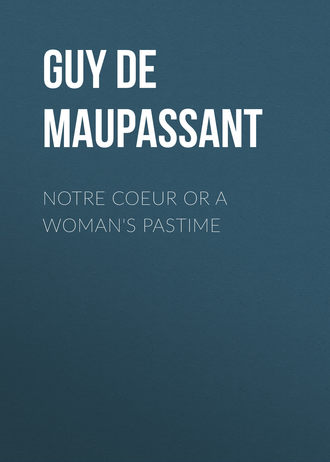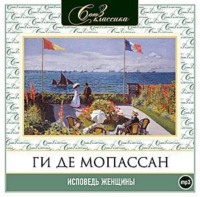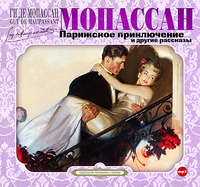 полная версия
полная версияNotre Coeur or A Woman's Pastime
In all her inchoate attachments for the men called "superior," who had dazzled her for a few weeks, the short-lived effervescence of her heart had always died away in irremediable disappointment. She looked for too much from their dispositions, their characters, their delicacy, their renown, their merits. In the case of everyone of them she had been compelled to open her eyes to the fact that the defects of great men are often more prominent than their merits; that talent is a special gift, like a good digestion or good eyesight, an isolated gift to be exercised, and unconnected with the aggregate of personal charm that makes one's relations cordial and attractive.
Since she had known Mariolle, however, she was otherwise attached to him. But did she love him, did she love him with the love of woman for man? Without fame or prestige, he had conquered her affections by his devotedness, his tenderness, his intelligence, by all the real and unassuming attractions of his personality. He had conquered, for he was constantly present in her thoughts; unremittingly she longed for his society; in all the world there was no one more agreeable, more sympathetic, more indispensable to her. Could this be love?
She was not conscious of carrying in her soul that divine flame that everyone speaks of, but for the first time she was conscious of the existence there of a sincere wish to be something more to this man than merely a charming friend. Did she love him? Does love demand that a man appear endowed with exceptional attractions, that he be different from all the world and tower above it in the aureole that the heart places about its elect, or does it suffice that he find favor in your eyes, that he please you to that extent that you scarce know how to do without him? In the latter event she loved him, or at any rate she was very near loving him. After having pondered deeply on the matter with concentrated attention, she at length answered herself: "Yes, I love him, but I am lacking in warmth; that is the defect of my nature."
Still, she had felt some warmth a little while before when she saw him coming toward her upon the terrace in the garden of Avranches. For the first time she had felt that inexpressible something that bears us, impels us, hurries us toward some one; she had experienced great pleasure in walking at his side, in having him near her, burning with love for her, as they watched the sun sinking behind the shadow of Mont Saint-Michel, like a vision in a legend. Was not love itself a kind of legend of the soul, in which some believe through instinct, and in which others sometimes also come to believe through stress of pondering over it? Would she end by believing in it? She had felt a strange, half-formed desire to recline her head upon the shoulder of this man, to be nearer to him, to seek that closer union that is never found, to give him what one offers vainly and always retains: the close intimacy with one's inner self.
Yes, she had experienced a feeling of warmth toward him, and she still felt it there at the bottom of her heart, at that very moment. Perhaps it would change to passion should she give way to it. She opposed too much resistance to men's powers of attraction; she reasoned on them, combated them too much. How sweet it would be to walk with him on an evening like this along the river-bank beneath the willows, and allow him to taste her lips from time to time in recompense of all the love he had given her!
A window in the villa was flung open. She turned her head. It was her father, who was doubtless looking to see if she were there. She called to him: "You are not asleep yet?"
He replied: "If you don't come in you will take cold."
She arose thereupon and went toward the house. When she was in her room she raised her curtains for another look at the mist over the bay, which was becoming whiter and whiter in the moonlight, and it seemed to her that the vapors in her heart were also clearing under the influence of her dawning tenderness.
For all that she slept soundly, and her maid had to awake her in the morning, for they were to make an early start, so as to have breakfast at the Mount.
A roomy wagonette drew up before the door. When she heard the rolling of the wheels upon the sand she went to her window and looked out, and the first thing that her eyes encountered was the face of André Mariolle who was looking for her. Her heart began to beat a little more rapidly. She was astonished and dejected as she reflected upon the strange and novel impression produced by this muscle, which palpitates and hurries the blood through the veins merely at the sight of some one. Again she asked herself, as she had done the previous night before going to sleep: "Can it be that I am about to love him?" Then when she was seated face to face with him her instinct told her how deeply he was smitten, how he was suffering with his love, and she felt as if she could open her arms to him and put up her mouth. They only exchanged a look, however, but it made him turn pale with delight.
The carriage rolled away. It was a bright summer morning; the air was filled with the melody of birds and everything seemed permeated by the spirit of youth. They descended the hill, crossed the river, and drove along a narrow, rough, stony road that set the travelers bumping upon their seats. Mme. de Burne began to banter her uncle upon the condition of this road; that was enough to break the ice, and the brightness that pervaded the air seemed to be infused into the spirit of them all.
As they emerged from a little hamlet the bay suddenly presented itself again before them, not yellow as they had seen it the evening before, but sparkling with clear water which covered everything, sands, salt-meadows, and, as the coachman said, even the very road itself a little way further on. Then, for the space of an hour they allowed the horses to proceed at a walk, so as to give this inundation time to return to the deep.
The belts of elms and oaks that inclosed the farms among which they were now passing momentarily hid from their vision the profile of the abbey standing high upon its rock, now entirely surrounded by the sea; then all at once it was visible again between two farmyards, nearer, more huge, more astounding than ever. The sun cast ruddy tones upon the old crenelated granite church, perched on its rocky pedestal. Michèle de Burne and André Mariolle contemplated it, both mingling with the newborn or acutely sensitive disturbances of their hearts the poetry of the vision that greeted their eyes upon this rosy July morning.
The talk went on with easy friendliness. Mme. Valsaci told tragic tales of the coast, nocturnal dramas of the yielding sands devouring human life. M. Valsaci took up arms for the dike, so much abused by artists, and extolled it for the uninterrupted communication that it afforded with the Mount and for the reclaimed sand-hills, available at first for pasturage and afterward for cultivation.
Suddenly the wagonette came to a halt; the sea had invaded the road. It did not amount to much, only a film of water upon the stony way, but they knew that there might be sink-holes beneath, openings from which they might never emerge, so they had to wait. "It will go down very quickly," M. Valsaci declared, and he pointed with his finger to the road from which the thin sheet of water was already receding, seemingly absorbed by the earth or drawn away to some distant place by a powerful and mysterious force.
They got down from the carriage for a nearer look at this strange, swift, silent flight of the sea, and followed it step by step. Now spots of green began to appear among the submerged vegetation, lightly stirred by the waves here and there, and these spots broadened, rounded themselves out and became islands. Quickly these islands assumed the appearance of continents, separated from each other by miniature oceans, and finally over the whole expanse of the bay it was a headlong flight of the waters retreating to their distant abode. It resembled nothing so much as a long silvery veil withdrawn from the surface of the earth, a great, torn, slashed veil, full of rents, which left exposed the wide meadows of short grass as it was pulled aside, but did not yet disclose the yellow sands that lay beyond.
They had climbed into the carriage again, and everyone was standing in order to obtain a better view. The road in front of them was drying and the horses were sent forward, but still at a walk, and as the rough places sometimes caused them to lose their equilibrium, André Mariolle suddenly felt Michèle de Burne's shoulder resting against his. At first he attributed this contact to the movement of the vehicle, but she did not stir from her position, and at every jolt of the wheels a trembling started from the spot where she had placed herself and shook all his frame and laid waste his heart. He did not venture to look at the young woman, paralyzed as he was by this unhoped-for familiarity, and with a confusion in his brain such as arises from drunkenness, he said to himself: "Is this real? Can it be possible? Can it be that we are both losing our senses?"
The horses began to trot and they had to resume their seats. Then Mariolle felt some sudden, mysterious, imperious necessity of showing himself attentive to M. de Pradon, and he began to devote himself to him with flattering courtesy. Almost as sensible to compliments as his daughter, the father allowed himself to be won over and soon his face was all smiles.
At last they had reached the causeway and were advancing rapidly toward the Mount, which reared its head among the sands at the point where the long, straight road ended. Pontorson river washed its left-hand slope, while, to the right, the pastures covered with short grass, which the coachman wrongly called "samphire," had given way to sand-hills that were still trickling with the water of the sea. The lofty monument now assumed more imposing dimensions upon the blue heavens, against which, very clear and distinct now in every slightest detail, its summit stood out in bold relief, with all its towers and belfries, bristling with grimacing gargoyles, heads of monstrous beings with which the faith and the terrors of our ancestors crowned their Gothic sanctuaries.
It was nearly one o'clock when they reached the inn, where breakfast had been ordered. The hostess had delayed the meal for prudential reasons; it was not ready. It was late, therefore, when they sat down at table and everyone was very hungry. Soon, however, the champagne restored their spirits. Everyone was in good humor, and there were two hearts that felt that they were on the verge of great happiness. At dessert, when the cheering effect of the wine that they had drunk and the pleasures of conversation had developed in their frames the feeling of well-being and contentment that sometimes warms us after a good meal, and inclines us to take a rosy view of everything, Mariolle suggested: "What do you say to staying over here until to-morrow? It would be so nice to look upon this scene by moonlight, and so pleasant to dine here together this evening!"
Mme. de Burne gave her assent at once, and the two men also concurred. Mme. Valsaci alone hesitated, on account of the little boy that she had left at home, but her husband reassured her and reminded her that she had frequently remained away before; he at once sat down and dispatched a telegram to the governess. André Mariolle had flattered him by giving his approval to the causeway, expressing his judgment that it detracted far less than was generally reported from the picturesque effect of the Mount, thereby making himself persona grata to the engineer.
Upon rising from table they went to visit the monument, taking the road of the ramparts. The city, a collection of old houses dating back to the Middle Ages and rising in tiers one above the other upon the enormous mass of granite that is crowned by the abbey, is separated from the sands by a lofty crenelated wall. This wall winds about the city in its ascent with many a twist and turn, with abrupt angles and elbows and platforms and watchtowers, all forming so many surprises for the eye, which, at every turn, rests upon some new expanse of the far-reaching horizon. They were silent, for whether they had seen this marvelous edifice before or not, they were equally impressed by it, and the substantial breakfast that they had eaten, moreover, had made them short-winded. There it rose above them in the sky, a wondrous tangle of granite ornamentation, spires, belfries, arches thrown from one tower to another, a huge, light, fairy-like lace-work in stone, embroidered upon the azure of the heavens, from which the fantastic and bestial-faced array of gargoyles seemed to be preparing to detach themselves and wing their flight away. Upon the northern flank of the Mount, between the abbey and the sea, a wild and almost perpendicular descent that is called the Forest, because it is covered with ancient trees, began where the houses ended and formed a speck of dark green coloring upon the limitless expanse of yellow sands. Mme. de Burne and Mariolle, who headed the little procession, stopped to enjoy the view. She leaned upon his arm, her senses steeped in a rapture such as she had never known before. With light steps she pursued her upward way, willing to keep on climbing forever in his company toward this fabric of a vision, or indeed toward any other end. She would have been glad that the steep way should never have an ending, for almost for the first time in her life she knew what it was to experience a plenitude of satisfaction.
"Heavens! how beautiful it is!" she murmured.
Looking upon her, he answered: "I can think only of you."
She continued, with a smile: "I am not inclined to be very poetical, as a general thing, but this seems to me so beautiful that I am really moved."
He stammered: "I – I love you to distraction."
He was conscious of a slight pressure of her arm, and they resumed the ascent.
They found a keeper awaiting them at the door of the abbey, and they entered by that superb staircase, between two massive towers, which leads to the Hall of the Guards. Then they went from hall to hall, from court to court, from dungeon to dungeon, listening, wondering, charmed with everything, admiring everything, the crypt, with its huge pillars, so beautiful in their massiveness, which sustains upon its sturdy arches all the weight of the choir of the church above, and all of the Wonder, an awe-inspiring edifice of three stories of Gothic monuments rising one above the other, the most extraordinary masterpiece of the monastic and military architecture of the Middle Ages.
Then they came to the cloisters. Their surprise was so great that they involuntarily came to a halt at sight of this square court inclosing the lightest, most graceful, most charming of colonnades to be seen in any cloisters in the world. For the entire length of the four galleries the slender shafts in double rows, surmounted by exquisite capitals, sustain a continuous garland of flowers and Gothic ornamentation of infinite variety and constantly changing design, the elegant and unaffected fancies of the simple-minded old artists who thus worked out their dreams in stone beneath the hammer.
Michèle de Burne and André Mariolle walked completely around the inclosure, very slowly, arm in arm, while the others, somewhat fatigued, stood near the door and admired from a distance.
"Heavens! what pleasure this affords me!" she said, coming to a stop.
"For my part, I neither know where I am nor what my eyes behold. I am conscious that you are at my side, and that is all."
Then smiling, she looked him in the face and murmured: "André!"
He saw that she was yielding. No further word was spoken, and they resumed their walk. The inspection of the edifice was continued, but they hardly had eyes to see anything.
Nevertheless their attention was attracted for the space of a moment by the airy bridge, seemingly of lace, inclosed within an arch thrown across space between two belfries, as if to afford a way to scale the clouds, and their amazement was still greater when they came to the "Madman's Path," a dizzy track, devoid of parapet, that encircles the farthest tower nearly at its summit.
"May we go up there?" she asked.
"It is forbidden," the guide replied.
She showed him a twenty-franc piece. All the members of the party, giddy at sight of the yawning gulf and the immensity of surrounding space, tried to dissuade her from the imprudent freak.
She asked Mariolle: "Will you go?"
He laughed: "I have been in more dangerous places than that." And paying no further attention to the others, they set out.
He went first along the narrow cornice that overhung the gulf, and she followed him, gliding along close to the wall with eyes downcast that she might not see the yawning void beneath, terrified now and almost ready to sink with fear, clinging to the hand that he held out to her; but she felt that he was strong, that there was no sign of weakening there, that he was sure of head and foot; and enraptured for all her fears, she said to herself: "Truly, this is a man." They were alone in space, at the height where the sea-birds soar; they were contemplating the same horizon that the white-winged creatures are ceaselessly scouring in their flight as they explore it with their little yellow eyes.
Mariolle felt that she was trembling; he asked: "Do you feel dizzy?"
"A little," she replied in a low voice; "but in your company I fear nothing."
At this he drew near and sustained her by putting his arm about her, and this simple assistance inspired her with such courage that she ventured to raise her head and take a look at the distance. He was almost carrying her and she offered no resistance, enjoying the protection of those strong arms which thus enabled her to traverse the heavens, and she was grateful to him with a romantic, womanly gratitude that he did not mar their sea-gull flight by kisses.
When they had rejoined the others of the party, who were awaiting them with the greatest anxiety, M. de Pradon angrily said to his daughter: "Dieu! what a silly thing to do!"
She replied with conviction: "No, it was not, papa, since it was successfully accomplished. Nothing that succeeds is ever stupid."
He merely gave a shrug of the shoulders, and they descended the stairs. At the porter's lodge there was another stoppage to purchase photographs, and when they reached the inn it was nearly dinner-time. The hostess recommended a short walk upon the sands, so as to obtain a view of the Mount toward the open sea, in which direction, she said, it presented its most imposing aspect. Although they were all much fatigued, the band started out again and made the tour of the ramparts, picking their way among the treacherous downs, solid to the eye but yielding to the step, where the foot that was placed upon the pretty yellow carpet that was stretched beneath it and seemed solid would suddenly sink up to the calf in the deceitful golden ooze.
Seen from this point the abbey, all at once losing the cathedral-like appearance with which it astounded the beholder on the mainland, assumed, as if in menace of old Ocean, the martial appearance of a feudal manor, with its huge battlemented wall picturesquely pierced with loop-holes and supported by gigantic buttresses that sank their Cyclopean stone foundations in the bosom of the fantastic mountain. Mme. de Burne and André Mariolle, however, were not heedless of all that. They were thinking only of themselves, caught in the meshes of the net that they had set for each other, shut up within the walls of that prison to which no sound comes from the outer world, where the eye beholds only one being.
When they found themselves again seated before their well-filled plates, however, beneath the cheerful light of the lamps, they seemed to awake, and discovered that they were hungry, just like other mortals.
They remained a long time at table, and when the dinner was ended the moonlight was quite forgotten in the pleasure of conversation. There was no one, moreover, who had any desire to go out, and no one suggested it. The broad moon might shed her waves of poetic light down upon the little thin sheet of rising tide that was already creeping up the sands with the noise of a trickling stream, scarcely perceptible to the ear, but sinister and alarming; she might light up the ramparts that crept in spirals up the flanks of the Mount and illumine the romantic shadows of all the belfries of the old abbey, standing in its wondrous setting of a boundless bay, in the bosom of which were quiveringly reflected the lights that crawled along the downs – no one cared to see more.
It was not yet ten o'clock when Mme. Valsaci, overcome with sleep, spoke of going to bed, and her proposition was received without a dissenting voice. Bidding one another a cordial good night, each withdrew to his chamber.
André Mariolle knew well that he would not sleep; he therefore lighted his two candles and placed them on the mantelpiece, threw open his window, and looked out into the night.
All the strength of his body was giving way beneath the torture of an unavailing hope. He knew that she was there, close at hand, that there were only two doors between them, and yet it was almost as impossible to go to her as it would be to dam the tide that was coming in and submerging all the land. There was a cry in his throat that strove to liberate itself, and in his nerves such an unquenchable and futile torment of expectation that he asked himself what he was to do, unable as he was longer to endure the solitude of this evening of sterile happiness.
Gradually all the sounds had died away in the inn and in the single little winding street of the town. Mariolle still remained leaning upon his window-sill, conscious only that time was passing, contemplating the silvery sheet of the still rising tide and rejecting the idea of going to bed as if he had felt the undefined presentiment of some approaching, providential good fortune.
All at once it seemed to him that a hand was fumbling with the fastening of his door. He turned with a start: the door slowly opened and a woman entered the room, her head veiled in a cloud of white lace and her form enveloped in one of those great dressing-gowns that seem made of silk, cashmere, and snow. She closed the door carefully behind her; then, as if she had not seen him where he stood motionless – as if smitten with joy – in the bright square of moonlight of the window, she went straight to the mantelpiece and blew out the two candles.
CHAPTER V.
CONSPIRACY
They were to meet next morning in front of the inn to say good-bye to one another. André, the first one down, awaited her coming with a poignant feeling of mixed uneasiness and delight. What would she do? What would she be to him? What would become of her and of him? In what thrice-happy or terrible adventure had he engaged himself? She had it in her power to make of him what she would, a visionary, like an opium-eater, or a martyr, at her will. He paced to and fro beside the two carriages, for they were to separate, he, to continue the deception, ending his trip by way of Saint Malo, they returning to Avranches.
When would he see her again? Would she cut short her visit to her family, or would she delay her return? He was horribly afraid of what she would first say to him, how she would first look at him, for he had not seen her and they had scarcely spoken during their brief interview of the night before. There remained to Mariolle from that strange, fleeting interview the faint feeling of disappointment of the man who has been unable to reap all that harvest of love which he thought was ready for the sickle, and at the same time the intoxication of triumph and, resulting from that, the almost assured hope of finally making himself complete master of her affections.
He heard her voice and started; she was talking loudly, evidently irritated at some wish that her father had expressed, and when he beheld her standing at the foot of the staircase there was a little angry curl upon her lips that bespoke her impatience.
Mariolle took a couple of steps toward her; she saw him and smiled. Her eyes suddenly recovered their serenity and assumed an expression of kindliness which diffused itself over the other features, and she quickly and cordially extended to him her hand, as if in ratification of their new relations.








